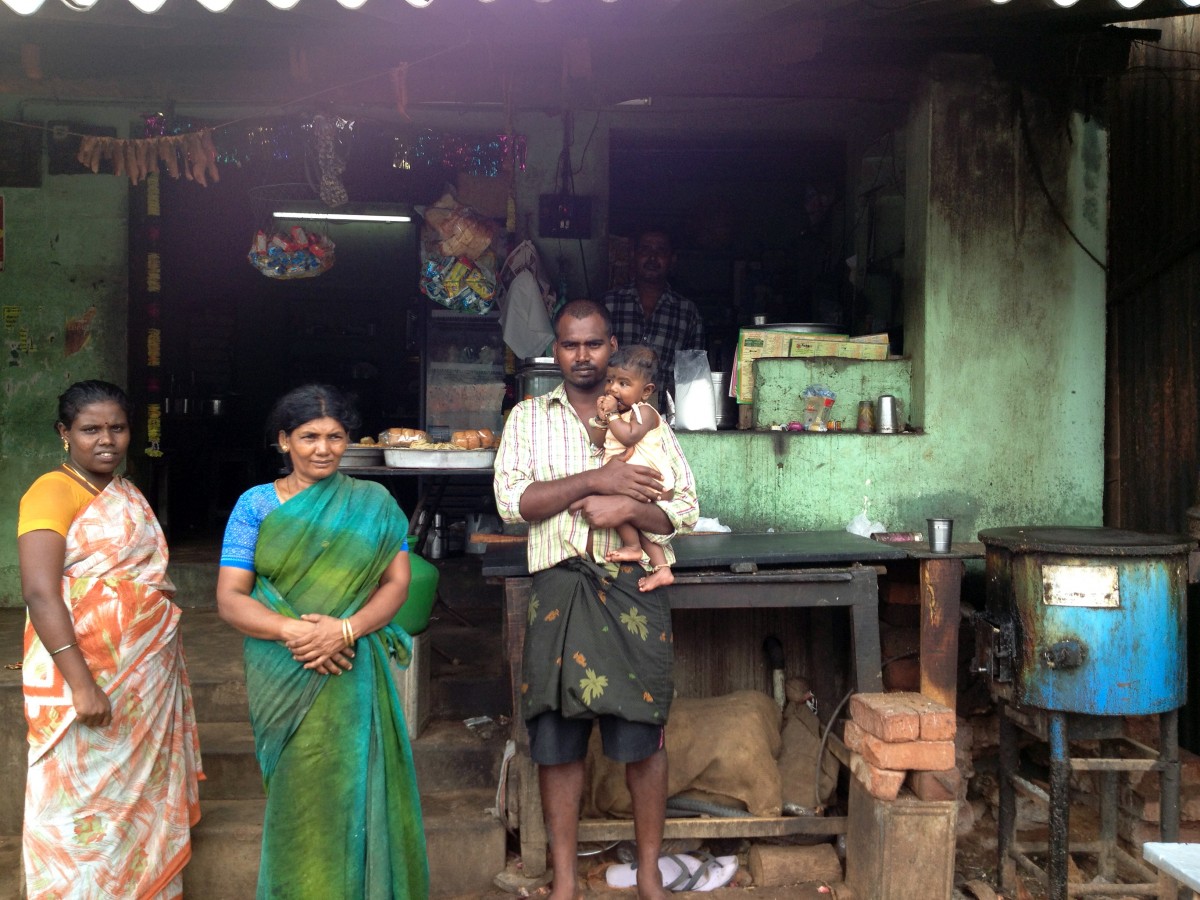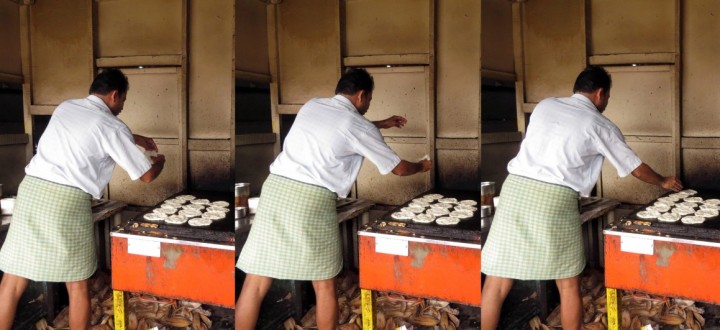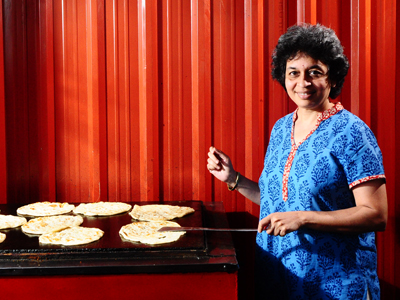India’s many roadways feature a diverse collection of roadside eateries, which produce some of the most delicious and fragrant Indian food ever imaginable. People from all walks of life enjoy taking a break from their day and popping in for a quick and delicious meal that can rival their grandmother’s cooking.
For centuries, roadside eateries have played an integral role in India’s culinary tradition and have provided livelihoods for millions; however, little has changed with regards to the types of stoves they use. Many use devices that are not only inefficient with regards to fuel consumption, but which also have a hugely negative impact on the health of their users, due to the smoke they produce. Over the past few years, the clean cookstove movement came out swinging. Yet, its primary focus, has been on cookstoves used in everyday households. Commercial businesses like roadside eateries have been left largely underserved with advances in clean cookstove technology largely focused on household designs.
Sustaintech, a social enterprise in India, quickly identified the gap and seized the opportunity. Sustaintech founder, Svati Bhogle, had been working to perfect clean cookstove technology for over 20 years. She began her cookstove career working for TIDE (Technology Informatics Design Endeavor), an NGO that seeks to promote sustainable development through design interventions where she quickly recognized that the commercial stove market was deeply underserved. In 2002, TIDE received a grant to start developing and distributing stoves for commercial customers. TIDE developed a product that fit the customers’ needs, but realized that they would never be able to achieve an impact of any scale without creating a separate company. She founded Sustaintech as a for-profit social enterprise to bring the stoves to the market.
Sustaintech focuses on designing and selling commercial clean cookstoves that cater to the base of the pyramid–specifically the owners of roadside eateries. Through their efforts, Sustaintech learned firsthand why the market has remained underserved for so long. Selling a new product to a relatively dispersed set of customers who haven’t seen new cooking technology in their lifetime is difficult, but Sustaintech realized that the positive environmental and health impact of reaching these customers made it worth the effort.
These Indian eateries do in fact have a few different stove options, but none are particularly beneficial. Most are costly and severely impact the environment and undermine the health of the workers who use them. Over the years, designs like the traditional mud stove pictured below, have changed little, reflected in their performance. Ultimately these eateries could benefit from advances in fuel efficient and smokeless stove designs that have characterized the clean cookstove movement.
The Global Alliance for Clean Cookstoves estimates that there are 170 million household cookstoves in India. While India’s estimated 10 million commercial cookstoves may pale in comparison, commercial cookstoves run eight to ten hours each day and at a much higher fuel consumption rate. The environmental impact of a commercial cookstove is about 10 times that of a household stove—meaning that if those 10 million commercial stoves were traded out, it would be equivalent to removing 100 million traditional household stoves from the market. Sustaintech stoves cut fuel consumption by 40-50% over a traditional stove, significantly reducing the demand on forest resources, which will likely become stressed as India’s population continues to grow.

Traditional stove designs give little consideration to the health of employees, which can, as a result, undermine their ability to earn a living. Through her time working with the eateries, Svati has found that cooks who use traditional stoves are rarely able to work past the age of 35 or 40 due to the constant exposure to heat and smoke. Additionally, many of these eateries are family-run businesses which causes children to be exposed to high levels of smoke and toxins on a daily basis. Restaurant owners report that because Sustaintech stoves produce less heat and smoke, their cooks have to take fewer sick days and the rest of the staff is more comfortable moving around the kitchen. Providing this market with clean cookstoves will have a demonstrable impact, especially on the health of children, giving them the opportunity to live healthier lives.

While these positive impacts make for a nice story, at the end of the day, it is the bottom line that drives purchasing decisions for these businesses. Unlike many subsidized household cookstoves that remain unused and idle, Sustaintech stoves continue to be used day after day. Customers consider their Sustaintech stoves a business investment, and as such, they learn how to use them properly and keep them maintained. Sustaintech developed a product that meets the needs of this underserved market. This product provides 50% increased fuel efficiency, which means that most customers pay for their new stoves based on fuel savings alone in just the first few months. Additionally, by improving their staff’s health, they are increasing their business’ efficiency and efficacy.
Though Sustaintech has grown consistently, the company is eager to scale more quickly and move beyond its current Tamil Nadu footprint so that it can provide clean commercial cookstoves to underserved customers across India and elsewhere. As is the case for most start-ups, the company’s greatest obstacle is that the processes and structure necessary for the company to scale successfully have not kept up with the growth of the company to date, and are starting to hold the company back. Sustaintech has figured out how to solve most of the challenges associated with accessing a market that is difficult to reach, but struggles to execute them consistently due to a lack of strong, well-defined processes that leaves Babu Subramanium, Sustaintech’s CEO, fighting proverbial fires instead of focusing on growing the company.

For the past four months, I’ve been working with Sustaintech to make their business processes more robust. The remainder of my project will focus on institutionalizing these standard processes and improving information flow with the goal of creating a more scalable organization. More robust processes will allow more decisions to be made at a lower level and thus reduce the need for management attention, while allowing decisions to be made faster so the company can be more responsive to the customer. Better information flow will give Babu the tools he needs to make more informed decisions that will help the company accelerate its growth. Together, these efforts will transform Sustaintech into a company capable of scale that can reach all of the underserved business customers across India, ensuring more Indians and visitors alike are well fed.
Paul Belknap
Paul Belknap is an MBAs Without Borders Advisor working with SustainTech, a social enterprise bringing fuel efficient wood cookstoves to India. Paul believes strongly that finding the right mix of social motivation and market driven business models will lead to sustainable and scalable solutions to the problems facing the world.







Pingback: Sustaintech Seeks to Transform India’s Co...
Over all sustain tech stoves seems to be a better choice than the commercial stoves. I definitely understand the health issues realated to these stoves and these stoves seems to be a better option. Better is good.